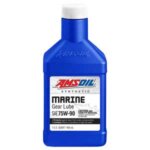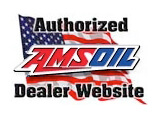24 Jul AMSOIL Marine- To Prevent Water Damage
Prevent Rust and other Water-related Problems
Water and gear lube don’t mix. Unfortunately, you can’t avoid submerging your marine’s lower unit and the lower unit’s combination of gears, bearings and other components turn horsepower into movement.
Lower units are resilient and last for years provided your service them annually. However, water can breach the seals and contaminate the gear lube in the lower unit, causing problems.
Water Contamination:
Bad for several reasons:
- Viscosity Loss: Viscosity measures a liquid’s resistance to flow or thickness. A marine motor’s lower unit is designed to use a gear lube of a specific viscosity for optimal wear protection. Water can reduce the gear lube’s viscosity below what the manufacturer recommends, reducing wear protection.
- Foam: A film of gear lube forms on the gear teeth it protects. This fluid film absorbs pressure and prevents metal-to-metal contact. Water contamination, however, invites the formation of foam. As the foam bubbles travel between gear teeth, they rupture under the intense pressure, leaving nothing behind to prevent metal-to-metal contact, which leads to premature wear and potential gear damage.
- Sludge: Water produces sludge, inhibiting heat transfer and increasing the lubricant temperature, which speeds chemical breakdown. The faster a lubricant breaks down, the sooner it fails to provide adequate protection, and the sooner it must be changed.
- Rust: Water contamination invites rust formation on metal surfaces. Rust can flake off and circulate throughout the gear lube, where it acts like sandpaper and scours bearing and gear surfaces .
The Solution
Avoiding contact with water is impossible when boating, so Amsoil engineered a synthetic marine gear lube (AGM) to deliver advanced protection against power loss and gear wear, even up to 15% water contamination.

